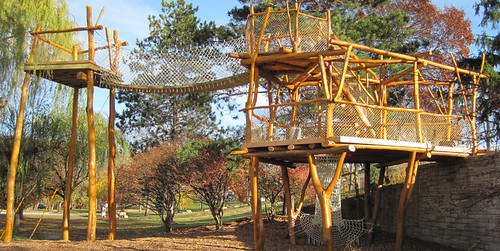
With Mother Nature providing the raw material, a company based in Madison, Wisconsin, saw a chance to grow its business, help the local economy, and promote a sustainable environment all at the same time.
WholeTrees Architecture and Structures is a small, woman-owned business that has successfully leveraged four Small Business Innovation Research (SBIR) grants into a business opportunity that has increased local revenue and grown the company from six employees and gross income of $150,000 in 2009 to 17 employees and gross income of about $1 million in 2013. The company projects revenue increasing to $4 million by 2016. USDA’s National Institute of Food and Agriculture (NIFA) administered the SBIR grants.
WholeTrees has carved its niche in the building industry by using small-diameter round timber, including diseased trees and beetle-killed emerald ash, in its architecture. About 8,500 ash trees in and around Madison will be put to the axe due infestation of the emerald ash borer, an invasive species native to eastern Asia. An estimated 50 million ash trees in the Midwest have already been killed by the pest. According to WholeTrees, harvesting these trees and using them as construction material provides an avenue for carbon sequestration and helps managed forests perform better as carbon sinks.
“The SBIR grant program has been instrumental to our growth as a company and as thought leaders in the uses of round timber in construction,” Amelia Baxter, president and co-founder of WholeTrees, said.
SBIR grants are awarded competitively to qualified small businesses supporting high quality, advanced concepts research to help solve agricultural challenges that could benefit us all. SBIR Phase I grants are limited to $100,000 over an 8 month period, whereas Phase II grants may reach $450,000 and 2 years duration. Only successful Phase I grantees are eligible for Phase II grants.
With its first Phase 1 grant, WholeTrees partnered with the USDA Forest Products Laboratory in Madison to study the strength of round timber when stressed in different ways. Results showed that branched round timber is stronger than predicted, but when it broke the points were predictable, thereby making it potentially easier to assign design values.
The second SBIR grant, a Phase II, allowed the company to develop innovative steel connections that leverage timber strength without affecting the integrity of its fibers. This allowed WholeTrees to develop “Y-branched” columns and beams that are now being sold regionally and nationally.
WholeTrees next used a Phase I grant to develop prototype software that reads 3D digital scans of small diameter timber to capture geometric characteristics. This technology gives a “yes” or “no” grade on the structural application of individual pieces of timber.
The company just earned a new SBIR Phase II grant that will allow them to improve the capacity of the prototype software by linking its analysis to structural design values developed in the previous grants.
The company has built its research and development platform on what the national construction market will need to adopt small-diameter round timber. “WholeTrees exists to create higher value construction markets for small diameter timber, and if it succeeds, then forests can be more profitable and rural economies can sustain more jobs,” Baxter said.
“Forests are the globe's air and water cleaning machines! They are the ultimate climate solution, but are not valued as such,” Baxter said. “Make forests profitable and we'll keep them. WholeTrees takes a brilliant structural material crafted by air, water and sunlight, and adds state-of-the art engineering and technology to cost-effectively bring new product to a 21st century market.”
NIFA is USDA’s leading extramural research agency. Through federal funding and leadership for research, education and extension programs, NIFA focuses on investing in science and solving critical issues impacting people's daily lives and the nation's future. For more information, visit www.nifa.usda.gov.

